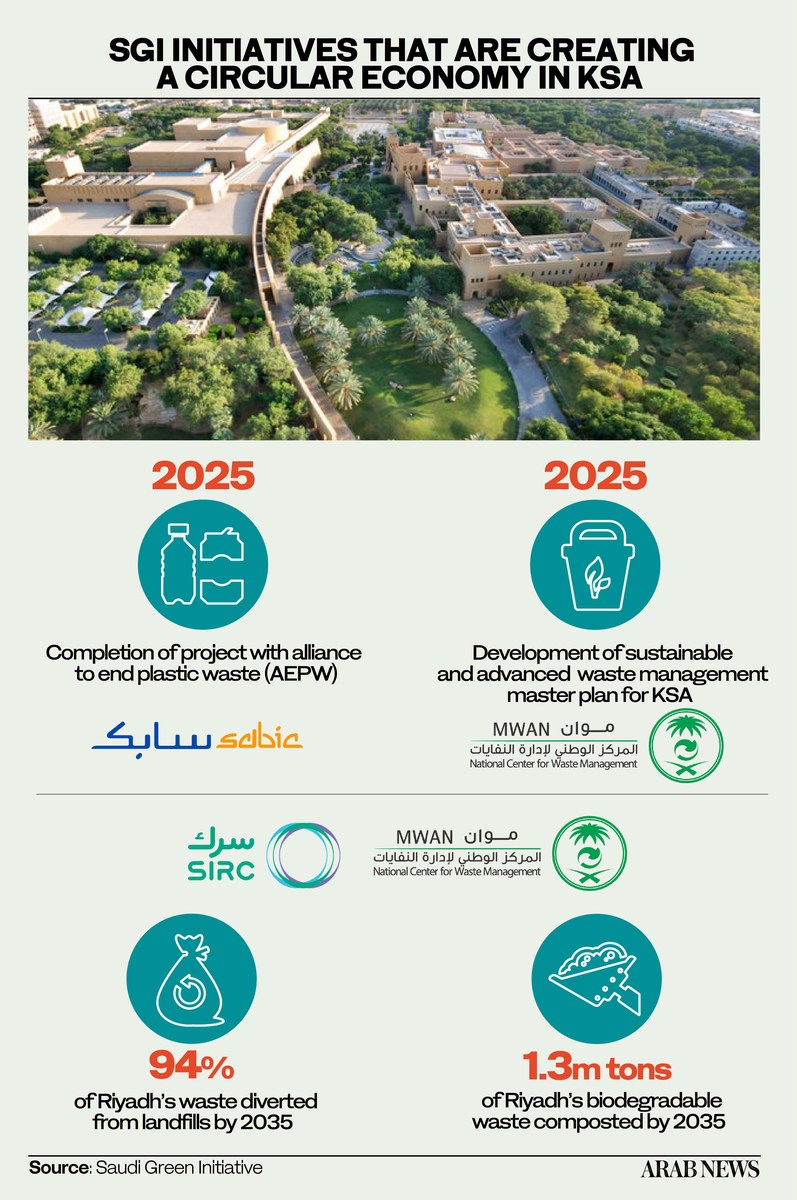RIYADH: As the world is getting choked by plastic pollution, the planet is set to ring in another Environment Day on June 5, focused on ending the nondegradable waste’s disastrous effects.
According to the UN Environment Programme, the world produces around 400 million tons of plastic annually, and just 9 percent of it gets recycled. What is worse? Almost 130,000 tons of plastic waste end up in the ocean every year.
Within three years of its launch, the Saudi Green Initiative is playing a crucial role regionally in protecting the environment and reducing the use of plastic.
Throughout these three years, the initiatives of the SGI have supported international efforts to remove plastic from oceans, develop innovative waste management systems at a national level and divert waste from landfill sites.
Catalyzing the SGI’s ambition to ensure a sustainable future, Saudi Basic Industries Corp. is participating in the Alliance to End Plastic Waste Program to clean plastic from the oceans.

The initiative, expected to be completed in 2025, supports accelerated improvements to current waste management systems in developed regions.
Earlier in January, SABIC reaffirmed its commitment to accelerating the circular carbon economy by announcing plans to process 1 million metric tons of plastics through its Trucircle solutions initiative.
Trucircle is a portfolio of products SABIC offers, which include circular and bio-based products based on second- and third-generation renewable feedstock, mechanically recycled polymers, ocean and ocean-bound recycled solutions, and closed-loop services and designs for recyclability.
Meanwhile, Saudi Investment Recycling Co. and National Center for Waste Management are leading an initiative to transform waste management in Riyadh. This program aims to divert 94 percent of waste generated in Riyadh away from landfills and compost more than 1.3 million tons of biodegradable waste.
This program aims to create a proven waste management model that will be implemented across the Kingdom by 2035, which is expected to reduce 4.1 metric tons per annum of carbon dioxide emissions.
Moreover, a separate SGI initiative with the NCWM is developing a comprehensive national waste management master plan for the Kingdom, pioneering circular economy practices. This project is expected to be completed by 2025.
The SGI, inspired by Saudi Arabia’s commitment to achieving net-zero emissions by 2060, has also launched several initiatives, including investing in new energy sources, improving energy efficiency and developing a carbon capture and storage program.
Furthermore, the SGI has also committed to planting 10 billion trees across Saudi Arabia and rehabilitating 40 million hectares of land to restore the Kingdom’s natural beauty.
Earlier in April, the annual report issued by the National Transformation Program suggested that Saudi Arabia planted over 12 million trees in the past five years through the National Center for Vegetation Development.
Since the launch of the SGI, Saudi Arabia has planted 18 million trees within the Kingdom, of which 13 million are mangroves. Regionally, the SGI plans to plant 50 billion trees across the Middle East and restore an area equivalent to 200 million hectares of degraded land which will, in turn, reduce global carbon levels by 2.5 percent.
As part of the SGI’s initiatives, Saudi Arabia has also committed to protecting 30 percent of its terrestrial and marine area and is working in partnership with leading international organizations, including the International Union for the Conservation of Nature, to safeguard the pristine landscapes of the Kingdom.













